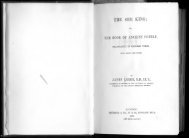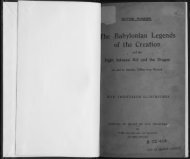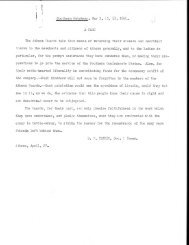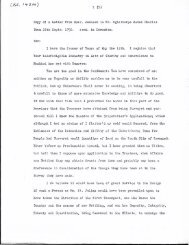You also want an ePaper? Increase the reach of your titles
YUMPU automatically turns print PDFs into web optimized ePapers that Google loves.
(46 HAKPEKS WEEKLY. [NOVEMBER 22, <strong>1862</strong>.<br />
THE ARMY OF THE OHIO.<br />
WE devote pages 744 and 746 to Illustrations <strong>of</strong><br />
THE ARMY OF THE OHIO ON THE MABOH, from<br />
sketches by Mr. Henry Holler. Of the centre pic<br />
ture Mr. M. writes:<br />
"On 26th October we started from Mount Vtr-<br />
non toward Somerset on our way to Bowling Green.<br />
It had snowed all the day before, and the mountain<br />
road had become one mass <strong>of</strong> mud, In some places<br />
knee-deep. The scene, however, was very imposing.<br />
The foliage was still green; autnmn had not yet<br />
tinged the leaves with its gaudy colors, and it con<br />
trasted finely with the white sheet <strong>of</strong> snow which<br />
covered the ground. The trees and branches, heav<br />
ily snow-laded, drooped gracefully toward the earth,<br />
and every now and then some great bough too<br />
"•eavlly freighted fell with a resounding crash.<br />
Afte.' a weary march <strong>of</strong> fifteen miles the troops en<br />
camped for the night at Somerset, without tents.<br />
You may fancy how they enjoyed the cold night,<br />
in their chilled, wet condition, sleeping in the open<br />
air. " WILD CAT Is a place where a battle was fought<br />
on 21st October, 1861. In the fore-ground I repre<br />
sent <strong>part</strong> <strong>of</strong> the earth-works thrown up at that time.<br />
The hills on the right, which are very high, com<br />
mand all the surrounding strong-holds. The scen<br />
ery is picturesque, and in a military point <strong>of</strong> view<br />
I think the height is impregnable.<br />
" Another picture represents a MARCH IN THE<br />
RAIN. This scene Is well impressed on my mem<br />
ory, as I got a good ducking, my India rubber<br />
being <strong>of</strong> no use whatever.<br />
" CLEARING THE ROAD OF FELLED TREES was<br />
a daily operation on our march. The rear <strong>of</strong><br />
Bragg's retreating army felled every tree which<br />
stood near enough the road to fall across it, and<br />
our advance column had to clear away the obstruc<br />
tions. We were <strong>of</strong>ten so close In pursuit that we<br />
could hear the crash <strong>of</strong> the falling trees.<br />
"The other pictures explain themselves."<br />
AN ARM FOR A HEART.<br />
ONE <strong>of</strong> Mrs. Meredith's "evenings" was two-<br />
thirds over. The lights shone gayly over fair wo<br />
men. Eyes sparkled, jewels flasHed, silken raiment<br />
glistened, filmy laces shook odors out upon the air.<br />
The dance music sounded merrily; for it was only<br />
the February <strong>of</strong>'61, aud people used to dance then<br />
—before the nation had been turned into two classes<br />
only, soldiers and mourners. Ethel Darricott was<br />
tired. She had been on the floor all the evening.<br />
She was glad now to obey her <strong>part</strong>ner's lead, and<br />
stop for a moment to rest upon a s<strong>of</strong>a, in the recess<br />
formed by a bay-window. The little nook was de<br />
serted just then, as it chanced, and it looked quiet<br />
and inviting—a little withdrawn from the confu<br />
sion, and yet in sight <strong>of</strong> all the light, and glitter,<br />
and movement.<br />
Miss Darricott had danced more than half the<br />
evening with this same <strong>part</strong>ner—Howard Revere.<br />
He was a handsome, haughty, indolent man; young<br />
still, scarcely twenty-five, indeed; but with an air<br />
<strong>of</strong> command, careless yet absolute, that made you<br />
think him much older. There was something in<br />
scrutable, something which piqued yonr curiosity,<br />
in the expression <strong>of</strong> his face—a look in his dark<br />
eyes which might mean so many things that you<br />
lost yourself in a mist <strong>of</strong> speculation. He was tall<br />
and vigorous, with jnscles that would have set<br />
the " strong man" • .azy with envy; and yet a lazy,<br />
nonchalant air, as if he would like some one to<br />
save him the trouble <strong>of</strong> lifting his own fingers.<br />
Misa Darricott was happy sitting there by his<br />
side, both <strong>of</strong> them silent, with the bright dresses<br />
and fair faces circling mazily in front <strong>of</strong> them, and<br />
the dance music so merry that it was sad with ite<br />
own madness <strong>of</strong> mirth sounding In their ears.<br />
They looked on for a while without speaking—<br />
then Miss Darricott said, musingly:<br />
"A great many pretty faces, aren't there?"<br />
" I suppose so. I was just wondering why none<br />
<strong>of</strong> them looked <strong>part</strong>icularly pretty to me. I won<br />
der Is it always so, Ethel—that when a man truly<br />
loves one he sees some defect in all others because<br />
they are not just like her?"<br />
He had never called her Ethel before. It quick<br />
ened her heart-beats a little, and she did not an<br />
swer him because she did not know what to say.<br />
He did not notice, at least he went on speaking<br />
slowly, half involuntarily as it were, words which<br />
would be said.<br />
"I don't know why I tell yon now, Ethel. I<br />
surely did not mean to when I made you sit down<br />
here; bnt I love you. I want you to be mine, my<br />
wife, by my side forever—to fill up a great void<br />
there is in my life. What does "your heart say ?<br />
Canyon come?"<br />
Mise Darricott did not speak for a little while.<br />
She was asking herself his question over again—it<br />
was not whether she loved him, hut whether she<br />
could shore his destiny, be his wife. She grew<br />
pale a little before she answered, but her reply,<br />
when it came, w*s firmly spoken—<br />
"No!"<br />
Howard Revere turned and looked at her a mo<br />
ment—looked into her eyes and at her face, whose<br />
language was firm as her tone had been. He did<br />
not expostulate with her or entreat her. It would<br />
not have been like him. He only bowed.<br />
" Will you dance ?" he said, rising a moment<br />
after, as a new set was forming. She put a cold<br />
h.ind into his, and went again among the dancers'.<br />
Miss Darricott had a cousin—a year older, a lit<br />
tle less beautiful, but with a keen insight into men<br />
anil things. She was an orphan, living with the<br />
family <strong>of</strong> her Uncle Darricott almost as a daugh<br />
ter. That night the two lingered over the fire in<br />
die littiu dressing-room between their two rooms,<br />
and talked together as girls do after halls. Only<br />
Ethel was more silent than usual, and her cousin<br />
Grace watched her anxiously but furtively.<br />
" Have you not lost something?" Grace Inquired<br />
at length, with a covert meaning in her tone.<br />
" No, I believe not," glancing at rings and brace<br />
lets.<br />
"Lost was not a good word, perhaps. I mean<br />
have you not thrown away something to-night<br />
which you will want, and leek for vainly as the<br />
years go on ?"<br />
Ethel's 1 eye fell beneath the keen yet kindly<br />
glance which searched her face. Her cheeks col<br />
ored. Her answer was a question scarcely to the<br />
point.<br />
" How do yon know every thing, Grace ? How<br />
did you guese this ?"<br />
" I saw it all in pantomime. Words could not<br />
have been so expressive as your face and his. I<br />
was sorry, for I believe you love him."<br />
" I fear I do. But he did not ask me that; he<br />
only asked if I could be his wife."<br />
" And you told him no ? I am sorry,- for I do<br />
not think he will ever ask again. If you love him<br />
why not marry him ?"<br />
11 Because I feared I might stop loving him some<br />
day. To live the listless, aimless life we women<br />
do is bad enough. It <strong>of</strong>fends both my taste and<br />
my principles to see a man idling away life in this<br />
world, where so many harvest fields are waiting."<br />
Grace looked at her cousin with a changed ex<br />
pression.<br />
" I thought I understood you, Ethel, and yet I<br />
should never have given you credit for such a rea<br />
son. What you say is certainly right and true in<br />
the main, only I do not think it applies to Mr.<br />
Revere. There U a difference between an idle,<br />
aimless life, and one <strong>of</strong> waiting till one's right work<br />
comes."<br />
" What makes you reckon Mr. Revere among the<br />
waiters?"<br />
" Because it is not in his nature to like idleness<br />
or inaction. I can see that he is restive under it.<br />
But lie is not fond <strong>of</strong> vain labor, <strong>of</strong> wasting strength.<br />
Did you never Isarn that those who wait serve also ?<br />
Howard Revere's time will come, and his life will<br />
be one not to shame any woman that loved him.<br />
But it's useless talking now. It would not be like<br />
him ever to say over again what he said to-night."<br />
Ethel Darricott tried to be light-hearted when<br />
she was alone; but it was a miserable failure, and<br />
she gave up at last to the tears that would come.<br />
Her cousin's words disquieted her strangely. Had<br />
she indeed thrown away the one pure pearl Fate<br />
would pr<strong>of</strong>fer her in thra life, and would its white<br />
glory never again gladden heart and eyes, though<br />
she should seek a place <strong>of</strong> repentance even with<br />
tears?<br />
So it went on till the surrender <strong>of</strong> Suuiter, and<br />
the call which summoned the loyal North to arms.<br />
Among the first to voluntser his services was the<br />
man she had thought so fond <strong>of</strong> ease and self, so<br />
fearful <strong>of</strong> fatigue, so laggard in the race <strong>of</strong> life.<br />
His name was enrolled as a private at first, but his<br />
company chose him unanimously for captain, and<br />
so Captain Revere led them on to the defense <strong>of</strong><br />
Washington.<br />
Before he left he called to bid Ethel good-by;<br />
but other gusete were in the drawing-room, and he<br />
did not see her alone. Only when he was leaving<br />
she stepped to the door with him, and hejield her<br />
hand for a moment. Perhaps that touch conjured<br />
his soul to his lips. At any rate he said what he<br />
had not meant to say.<br />
"You are not all to me that I once hoped you<br />
would be, Ethel; but you are my friend, are you<br />
not? Yon will think <strong>of</strong> me sometimes, and be<br />
sorry for me a little if I fall?"<br />
" You will not fall," Ethel said, resolutely, forc<br />
ing back the tears that threatened to choke her.<br />
" I shall think <strong>of</strong> you, and when you come back L<br />
shall welcome you, and be proud <strong>of</strong> my friend."<br />
" If I do not come back," he said, wringing her<br />
hand as he turned away, " God bless you. I have<br />
not changed in my estimation <strong>of</strong> you because your<br />
heart would not let yon be altogether mine."<br />
He went away with those words, and then Ethel<br />
knew how she had loved him.<br />
The next day came—the soldiers were gone, and<br />
Ethel Darricott tried to take up cheerfully the rem<br />
nant <strong>of</strong> life which was left to her. The best half<br />
and the dearest, she felt, was gone with him; but<br />
much remained to do, somewhat even to rejoice in.<br />
She was not more exacting <strong>of</strong> others than she was<br />
<strong>of</strong> herself. To have yielded idly to her grief would<br />
have hsen to be false to her ideal. Even her own<br />
father saw no change in her.<br />
So the months passed on for more than a year,<br />
even to the terrible six days <strong>of</strong> fighting before<br />
Richmond. In all this time Captain Revere had<br />
never been seriously wounded, and had never left<br />
the post <strong>of</strong> duty. Other men took furloughs—some<br />
on slight pretexts — and came home; he never.<br />
Perhape he felt that he had no true home, and no<br />
hope to lure him Northward, and so grew reckless<br />
<strong>of</strong> life. Miss Darricott meanwhile watched the<br />
papers anxiously. She saw his name <strong>of</strong>ten where<br />
brave deeds were told, heroic valor praised; and<br />
still he was unharmed. She began to believe that<br />
the ball was not yet cast which should work him<br />
woe; and sometimes, when she thought <strong>of</strong> the fu<br />
ture, a sweet, scarcely recognized hope began to<br />
flutter its wings tremblingly in her heart. Grace<br />
might not have been right, after all. He might<br />
come back yet, and say over again the words for<br />
whose remembered music her soul thirsted.<br />
But at last Fate and the Rebels were too strong<br />
for him. In the hattle <strong>of</strong> Centreville he lost an<br />
arm, and was severely wounded besides in the hip.<br />
The hospitals were full; and as soon as he could<br />
bear moving he was sent home. It was some weeks<br />
before he could walk at all, and then he was told<br />
that sea air would help to recruit his exhausted<br />
energies, and sent <strong>of</strong>f by his physician to Newport.<br />
Perhaps he went the more willingly because he<br />
knew that the Darricotts had a summer cottage<br />
there, and in his secret heart he was conscious <strong>of</strong> a<br />
longing to see Ethel again. And yet Grace had<br />
been right when she divined that he would never<br />
ask a second time the question he had asked on that<br />
February night. To have been twice rejected by<br />
the same woman would have been to him n moral<br />
impossibility. He hardly kuew himself why he<br />
wanted to see her, or what vague hope 1ft had.<br />
He had been in Newport a week before he called<br />
on her. He had trasUd to mating hir flrit by<br />
some accident. But she was evidently very re-<br />
tirsd. He concluded that fortune was not on bis<br />
side; and as he really wanted to see her very much<br />
gave over waiting for lucky chances, and went<br />
there.<br />
She was alone when his card was brought to<br />
her. She knew <strong>of</strong> his wound—knew what changes<br />
to expect in seeing him. She staid in her own<br />
room long enough to fortify herself, and make sure<br />
that she would betray no uncalled-for emotion.<br />
With face and manner schooled to mere friendli<br />
ness she went down. Her self-command almost<br />
failed her as he came to meet her with halting<br />
step, and she saw the empty coat-sleeve hanging<br />
at his side. It was so pitiful to note the decay <strong>of</strong><br />
that fine, vigorous, manly strength—to think <strong>of</strong><br />
the good right arm that he would never use more.<br />
"I am home for good now," he said, with an<br />
evident effort to bear himself cheerfully. "It is<br />
a great disappointment. I had so hoped to be able<br />
to help on the good cause till it reached the tri<br />
umphal end, which is sure to come."<br />
" Then you have no doubts <strong>of</strong> the final result?"<br />
Ethel asked, forcing herself to speak, and knowing<br />
that she could not trust her voice on any subject<br />
Ises general.<br />
" Not a doubt! The great cause <strong>of</strong> human lib<br />
erty is not to receive its death-blow in this land or<br />
this day. The world








